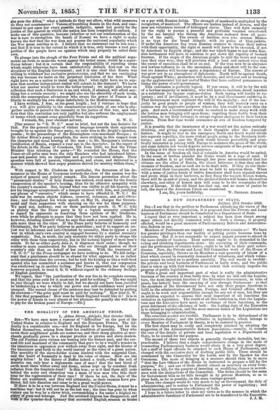A NEW DEPARTMENT OF STATE.
Belfast, 27th October 1855.
Sin—I see that in the petition to Parliament embodying the views of the Administrative Reform Association, it is proposed that the Private and Local business of Parliament should be transferred to a Department of State.
I regret that so very important a subject has been thus thrust among many others not directly connected with it. Such a change, if properly effected, would be a great measure of Parliamentary Reform and Administra- tive Reform in one.
Members of Parliament are unpaid : may they ever remain so ! We have few greater privileges than our facility of getting public business done by volunteers. But it is not reasonable to expect unpaid persons to attend to the mere details of business. Their services ought to be demanded in the ruling and thinking departments alone : the executing of their commands, and the performance of routine duties, ought to be left to their paid subor- dinates. Now, the Private and Local Bill Committee work of the House of Commons, especially, throws on its Members a vast quantity of labour of a kind which cannot be reasonably demanded of volunteers, and which volun- teers cannot be relied on to perform carefully. The evil result is twofold : the private and local business of Parliament is badly done, and the public time is taken up with that business to an extent that seriously impedes the progress of public. legislation.
While a great and important part of what is really the administrative business of the country is thus badly done by what we still call the Legisla- ture, the most important function of the Executive Government, in time of peace, has latterly been the carrying of acts through Parliament : so that the members of the Government have not only their proper functions to fulfil in the administration of Home, Foreign, and Colonial affairs, which ought to be work and responsibility enough for any set of men, but they are in addition expected to assume that most important of all functions the initiative in legislation. The result of all this confusion is, that the Legisla- ture and the Executive have made an exchange of their functions, to the great detriment of the efficiency of both : the leading duty of the Executive is to attend to legislations and the most onerous duties of the Legislature are those belonging to administration. The remedies needed are twofold. Parliament is to be disburdened of its administrative duties ; and the initiative in legislation, which belongs to every Member of Parliament in theory, is to be restored in practice.
The first object may be easily and completely attained by adopting the suggestion of the Administrative Reform Association,—namely, to transfer the care of the details of private and local legislation to a Department of State, to be created for the purpose.
The second of these two objects is generally thought desirable, but im- practicable. I believe that a single comprehensive change in the mode of transacting Parliamentary business would attain it in a very great degree. Let a staff of legal officials be attached to each House of Parliament, and charged with the exclusive duty of drafting public bills. These should be nominated by the Chancellor for the Lords, and by the Speaker for the Commons. The mode of bringing in a measure should then be to move " that the Law Officers of the House be instructed to prepare a bill for the purpose," 8se. ; and one of them should attend as secretary on every Com- mittee on a bill, for the purpose of inserting or modifying clauses in accord- ance with the instructions of the Committee. The forms should be the MEG for Government bills as for bills brought in by private Members, so as to place both, as far as possible, on the same vantage-ground.
These two changes would do very much to lay on Government the duty of administering, and to restore to Parliament the power of legislating ; and would immensely increase the efficiency of both.
I hope in a future letter to state my views as to the manner in which the administrative functions of Parliament are to be transferred to the Executive. I. J. M.


























 Previous page
Previous page